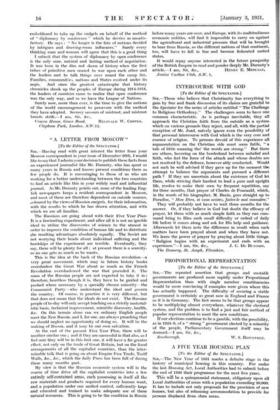" A LETTER FROM MOSCOW " [To the Editor of
the SPECTATOR.] SIR,—Having read with great interest the letter from your Moscow correspondent in your issue of December 20th, I would like to say that I admire your decision to publish these facts from an experienced journalist like Mr. Duranty, who has spent so many years in Russia and knows present conditions there as few people do. It is encouraging to those of us who are working for a better understanding between the two countries to find an article like this in your widely read and influential journal. As Mr. Duranty points out, none of the leading Eng- lish newspapers keeps a resident correspondent in Moscow, and most of them are therefore dependent on outside sources, coloured by the views of Russian emigres, for their information, with the results to which he has drawn attention, and with which we are all familiar.
The Russians are going ahead with their Five Year Plan. It is a fascinating experiment, and after all it is not an ignoble ideal to utilize the discoveries of science to the utmost hi order to improve the condition of human life and to distribute the resulting advantages absolutely equally. The Soviet are not worrying their heads about individual suffering and the hardships of the experiment are terrible. Eventually, they say, there will be plenty for all ; at present there is a scarcity, so no one gets as much as he wants.
This is the idea at the back of the Russian revolution—a very great movement, which may in future history books overshadow the Great War about as much as the French Revolution overshadowed the war that preceded it. The mass of the Russian people are not expected to take it in ; therefore, heartless though it is, they have to be guided and pushed where necessary by a specially chosen minority—the Communist Party—who understand the ideal and govern the country. Of course, in practice it is very different, but that does not mean that the ideals do not exist. The Russian people of to-day will only accept teaching on a strictly material- istic basis, technical improvement, scientific discovery, health, &c. On this terrain alone can we ordinary English people meet the New Russia, and I, for one, am always preaching that we should neglect no opportunity of doing so. It will be the making of Russia, and it may be our own salvation.
At the end of the present Five Year Plan, there will be another similar one ; and if they are successful in that also, as I feel sure they will be in this first one, it will have a far greater effect, not only on the trade of Great Britain, but on the fiscal arrangements of all the capitalist countries, than the inter- minable talk that is going on about Empire Free Trade, Tariff Walls, &c., &c., which the daily Press has been full of during these many months past.
My view is that the Russian economic system will in the course of time drive all the capitalist countries into a few entirely self-contained areas, each possessing in itself all the raw materials and products required for every human want, and a population under one unified control, sufficiently large and educated and trained to make adequate use of these natural resources. This is going to be the condition in Russia
before many years are over, and Europe, with its multitudinous economic entities, will find it impossible to carry on against the agricultural and industrial pressure that will be brought to bear from Russia, so the different nations of that continent, too, will have to fall in line and become federated united states.
It would repay anyone interested in the future prosperity of the British Empire to read and ponder deeply Mr. Duranty's
article.—I am, Sir, &c., HENRY E. METCALF. Junior Carlton Club, S.W. 1.






































 Previous page
Previous page